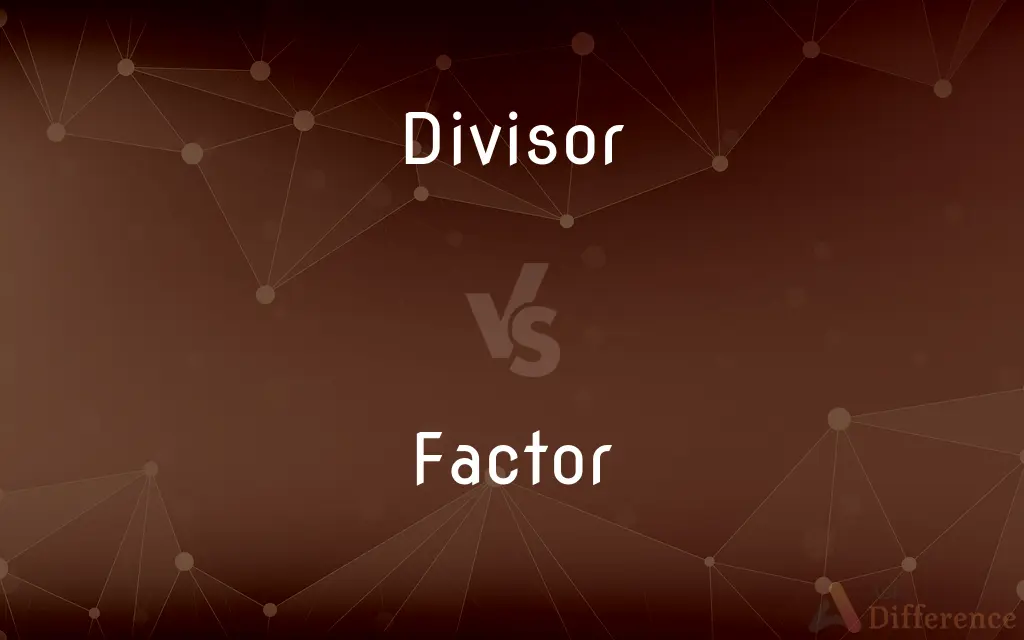Divisor vs. Factor — What's the Difference?
By Maham Liaqat & Urooj Arif — Updated on March 31, 2024
A divisor is a number that divides another without leaving a remainder, while a factor is a number that exactly divides another to produce a whole number.

Difference Between Divisor and Factor
Table of Contents
ADVERTISEMENT
Key Differences
Divisors and factors are terms frequently used in mathematics, specifically in division and multiplication contexts. A divisor is a number by which another number is divided. For instance, in the division 12 ÷ 3 = 4, 3 is the divisor. Whereas a factor is a number that divides another number exactly, fitting into multiplication scenarios. For example, in the multiplication 3 × 4 = 12, both 3 and 4 are factors of 12.
While the term "divisor" is used more generally in division operations, indicating any number that divides another, "factor" implies a more specific relationship where the division results in an integer. Factors are integral in finding the prime factors of a number, essential for various mathematical applications, while divisors are crucial in understanding division operations and their properties.
In practical terms, every factor of a number is also a divisor of that number since it divides the number without leaving a remainder. However, the term "divisor" can be used in broader mathematical contexts, not limited to integers. For example, 1.5 is a divisor of 4.5, but it's not considered a factor in the traditional sense, which typically refers to whole numbers.
The concepts of divisors and factors are crucial in algebra and number theory, aiding in the study of numbers, their properties, and relationships. For instance, knowing the factors of a number helps in simplifying algebraic expressions, while understanding divisors is key in solving division problems and in the study of fractions and ratios.
Factors are particularly important in the context of prime numbers and their role in various branches of mathematics and applied sciences. Divisors, on the other hand, have a broader application in mathematical operations, including those involving non-integer numbers. Both concepts are foundational, yet their specific applications and implications can differ significantly.
ADVERTISEMENT
Comparison Chart
Definition
A number that divides another number.
A number that exactly divides another number into an integer.
Context
Used in division operations.
Used in multiplication contexts and in finding prime factors.
Examples
In 12 ÷ 4 = 3, 4 is the divisor.
In 3 × 4 = 12, both 3 and 4 are factors of 12.
Specificity
Can refer to any number that divides another.
Implies a more specific relationship, typically involving integers.
Applications
Broad in mathematical operations, including fractions and ratios.
Essential in algebra, number theory, and simplifying expressions.
Compare with Definitions
Divisor
Utilized in operations beyond integers.
The concept of divisors extends to complex numbers.
Factor
An exact divisor of a number, used in multiplication.
3 and 4 are factors of 12 because 3 × 4 = 12.
Divisor
A number that can divide another number evenly.
2 is a divisor of 4 because 4 ÷ 2 = 2.
Factor
Aids in simplifying expressions.
Knowing factors is crucial for algebraic simplification.
Divisor
Includes non-integer numbers.
1.5 is a divisor of 4.5.
Factor
Emphasizes multiplication relationships.
Factors reveal how numbers multiply to form products.
Divisor
Applies to any division operation.
5 is a divisor of 15 since 15 ÷ 5 = 3.
Factor
Traditionally involves whole numbers.
6 is a factor of 12, contributing to its prime factorization.
Divisor
Helps grasp division concepts.
Understanding divisors is key to mastering division problems.
Factor
Used to find prime numbers that multiply to a given number.
The prime factors of 12 are 2 and 3.
Divisor
In mathematics, a divisor of an integer n {\displaystyle n} , also called a factor of n {\displaystyle n} , is an integer m {\displaystyle m} that may be multiplied by some integer to produce n {\displaystyle n} . In this case, one also says that n {\displaystyle n} is a multiple of m .
Factor
A circumstance, fact, or influence that contributes to a result
His skill was a factor in ensuring that so much was achieved
She worked fast, conscious of the time factor
Divisor
The quantity by which another quantity, the dividend, is to be divided.
Factor
A number or quantity that when multiplied with another produces a given number or expression
An amount that exceeds it by a factor of 1000 or more
Divisor
(arithmetic) A number or expression that another is to be divided by.
In "42 ÷ 3" the divisor is the 3.
Factor
A level on a scale of measurement.
Divisor
An integer that divides another integer an integral number of times.
The positive divisors of 6 are 1, 2, 3 and 6.
Factor
Any of a number of substances in the blood, mostly identified by numerals, which are involved in coagulation.
Divisor
The number by which the dividend is divided.
Factor
An agent who buys and sells goods on commission
His father was chief factor for the Hudson's Bay Company
Divisor
One of two or more integers that can be exactly divided into another integer;
What are the 4 factors of 6?
Factor
Another term for factorize
Last year researchers factored a number 155 digits long
Divisor
The number by which a dividend is divided
Factor
(of a company) sell (its invoices) to a factor
They collected rents while he factored these forfeited estates
Factor
One that actively contributes to an accomplishment, result, or process
"Surprise is the greatest factor in war" (Tom Clancy).
Factor
One who acts for someone else; an agent.
Factor
One who purchases accounts receivable at a discount.
Factor
(Mathematics) One of two or more quantities that divides a given quantity without a remainder. For example, 2 and 3 are factors of 6; a and b are factors of ab.
Factor
A quantity by which a stated quantity is multiplied or divided, so as to indicate an increase or decrease in a measurement
The rate increased by a factor of ten.
Factor
A gene. No longer in technical usage.
Factor
(Physiology) A substance that functions in a specific biochemical reaction or bodily process, such as blood coagulation.
Factor
To determine or indicate explicitly the factors of
If you factor 70, you get 2, 5, and 7.
Factor
To engage in purchasing accounts receivable at a discount.
Factor
(obsolete) A doer, maker; a person who does things for another person or organization.
The factor of the trading post bought the furs.
Factor
An agent or representative.
Factor
(legal)
Factor
A commission agent.
Factor
A person or business organization that provides money for another's new business venture; one who finances another's business.
Factor
A business organization that lends money on accounts receivable or buys and collects accounts receivable.
Factor
One of the elements, circumstances, or influences which contribute to produce a result.
The greatest factor in the decision was the need for public transportation.
The economy was a factor in this year's budget figures.
Factor
(mathematics) Any of various objects multiplied together to form some whole.
3 is a factor of 12, as are 2, 4 and 6.
The factors of the Klein four-group are both cyclic of order 2.
Factor
(causal analysis) Influence; a phenomenon that affects the nature, the magnitude, and/or the timing of a consequence.
The launch temperature was a factor of the Challenger disaster.
Factor
(economics) A resource used in the production of goods or services, a factor of production.
Factor
(Scotland) A steward or bailiff of an estate.
Factor
(transitive) To find all the factors of (a number or other mathematical object) (the objects that divide it evenly).
Factor
To be a product of other objects.
Factor
To sell a debt or debts to an agent (the factor) to collect.
Factor
One who transacts business for another; an agent; a substitute; especially, a mercantile agent who buys and sells goods and transacts business for others in commission; a commission merchant or consignee. He may be a home factor or a foreign factor. He may buy and sell in his own name, and he is intrusted with the possession and control of the goods; and in these respects he differs from a broker.
My factor sends me word, a merchant's fledThat owes me for a hundred tun of wine.
Factor
A steward or bailiff of an estate.
Factor
One of the elements or quantities which, when multiplied together, form a product.
Factor
One of the elements, circumstances, or influences which contribute to produce a result; a constituent; a contributory cause.
The materal and dynamical factors of nutrition.
Factor
To resolve (a quantity) into its factors.
Factor
Anything that contributes causally to a result;
A number of factors determined the outcome
Factor
An abstract part of something;
Jealousy was a component of his character
Two constituents of a musical composition are melody and harmony
The grammatical elements of a sentence
A key factor in her success
Humor: an effective ingredient of a speech
Factor
Any of the numbers (or symbols) that form a product when multiplied together
Factor
One of two or more integers that can be exactly divided into another integer;
What are the 4 factors of 6?
Factor
A businessman who buys or sells for another in exchange for a commission
Factor
An independent variable in statistics
Factor
(genetics) a segment of DNA that is involved in producing a polypeptide chain; it can include regions preceding and following the coding DNA as well as introns between the exons; it is considered a unit of heredity;
Genes were formerly called factors
Factor
Resolve into factors;
A quantum computer can factor the number 15
Common Curiosities
How do divisors and factors differ in use?
Divisors are used in general division contexts, including with non-integer numbers, while factors are specific to multiplication and integral in finding prime factorizations.
What is a factor?
A factor is a number that exactly divides another number into an integer, essential in multiplication and prime factorization.
Are all factors divisors?
Yes, all factors are divisors because they divide the number exactly without leaving a remainder.
Can divisors be non-integers?
Yes, divisors can be non-integers, unlike factors, which are typically considered to be whole numbers.
Why are factors important in algebra?
Factors are crucial in algebra for simplifying expressions and solving equations, especially when working with polynomials.
What is a divisor?
A divisor is a number that divides another number, possibly including decimals, used broadly in division operations.
How do you find the divisors of a number?
Divisors can be found by dividing the number by all integers up to and including itself and noting those that divide evenly.
What role do factors play in number theory?
Factors are fundamental in number theory for studying the properties of numbers, especially in the context of prime factorization and divisibility.
What is the significance of prime factors?
Prime factors are the building blocks of numbers, allowing any number to be broken down into a product of prime numbers, which is crucial for many areas of mathematics.
How do divisors and factors differ in mathematical operations?
Divisors have a broader application in various mathematical operations, including those with non-integers, while factors are more focused on multiplication and the decomposition of numbers into primes.
Can a number have divisors that are not factors?
In the context of whole numbers, all divisors that evenly divide the number are considered factors. However, when considering non-integers, divisors may not be factors.
How are divisors related to fractions and ratios?
Understanding divisors is essential for working with fractions and ratios, as it involves dividing numbers into parts or comparing them.
Can the terms divisor and factor be used interchangeably?
While they are closely related, they are not always interchangeable, as "divisor" can apply more broadly, including to non-integers, whereas "factor" implies a specific integer relationship in multiplication.
Is the number 1 considered a divisor and factor?
Yes, 1 is considered both a divisor and a factor of all numbers, as it divides every number exactly once.
How do you determine the factors of a number?
Factors are determined by finding all pairs of numbers that multiply together to give the original number, including 1 and the number itself.
Share Your Discovery

Previous Comparison
Bend vs. Flex
Next Comparison
Giving vs. SharingAuthor Spotlight
Written by
Maham LiaqatCo-written by
Urooj ArifUrooj is a skilled content writer at Ask Difference, known for her exceptional ability to simplify complex topics into engaging and informative content. With a passion for research and a flair for clear, concise writing, she consistently delivers articles that resonate with our diverse audience.














































